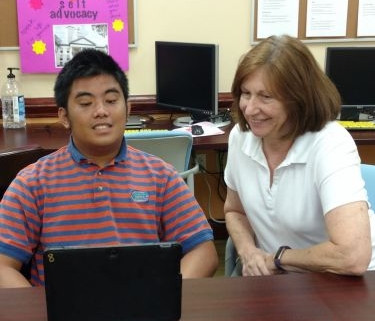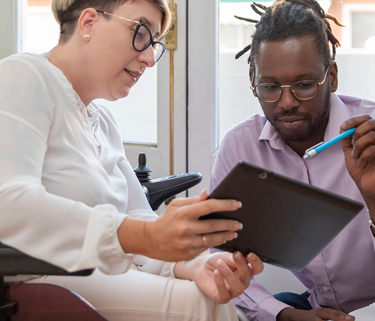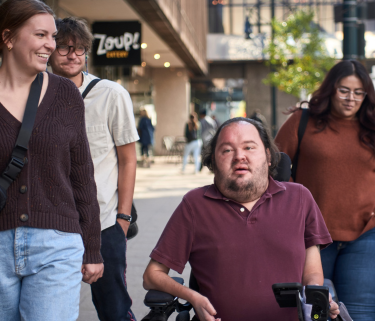Comcast Grants $1M to Transform The Arc’s Data, Tech Training, and Spanish Education Resources
Washington, DC – The Arc of the United States and Comcast NBCUniversal announced a major expansion of their long-standing partnership that will break down barriers and create more equity and opportunity for people with intellectual and developmental disabilities (IDD). Comcast is providing a $1 million grant over two years to The Arc to modernize its data infrastructure, deepen the impact of its digital literacy programs, and give Spanish-speaking families access to special education advocacy. This funding is a part of Project UP, Comcast’s $1 billion commitment to advance digital equity and help create a future of unlimited possibilities.
Robust data is the foundation for driving meaningful change. This investment will revolutionize how The Arc collects and analyzes information across its network of nearly 600 chapters nationwide. The new centralized data system will track vital services its chapters provide, capture the scope of The Arc’s collective impact, and reveal insights to better advocate for and support the IDD community. The benefits of this new technology will reach every stakeholder: the national office will better support its chapters, chapters will learn best practices from each other and better meet their community’s needs, and people with disabilities and their families will have a stronger federation to rely on.
“In our pursuit of a fully inclusive society, data is power,” said Katy Neas, CEO of The Arc of the United States. “This grant allows us to wield our collective strength across our nearly 600 chapters to more strategically uplift millions of people with disabilities across America, making our human impact even greater.”
Comcast has also supported The Arc’s efforts to ensure resources are accessible to Hispanic communities. Through funding in 2023, The Arc@School Special Education Advocacy Curriculum was translated into Spanish and launched in early 2024. As part of the new grant, The Arc will conduct targeted outreach to Hispanic communities through Spanish-language webinars, collaboration with Spanish-speaking Special Education Advocates, and local program access to help this underserved population become strong special education advocates. The funding will specifically provide subgrants to five chapters of The Arc—located in Arizona, Colorado, Florida, Texas, and Virginia—that will give 150 Spanish-speaking families free access to the program and host focus groups to learn and better ensure their children receive a quality public school education.
“For too long, students with disabilities have faced a whole host of barriers that have denied them the free, appropriate public education they are entitled to,” Katy Neas said. “It is essential that parents and school personnel alike fully understand their rights and responsibilities so that students get the education they need consistent with federal law. Our partnership with Comcast to get The Arc@School in the hands of more families and educators is tearing down those barriers in profound ways. With their support, we are empowering students to not only access the education they deserve but to truly thrive.”
In addition, the Comcast grant will support The Arc’s Tech Coaching Centers, which provide customized digital skills training to people with IDD. The Arc will broaden its training to include caregivers and family members, which will better integrate technology skills into all environments of a person’s daily life, and support a total of 10 sites across Colorado, Florida, Illinois, Indiana, Maryland, New Jersey, Oregon, Tennessee, and Texas. Since 2014, Comcast has helped The Arc’s Tech Coaching Centers empower over 2,500 people with IDD through training that advances measured outcomes in employment, health, independent living, education, and interpersonal connections.
“Whether it’s having a reliable job, managing your health, learning lifelong skills, or being socially connected—technology is the bridge to opportunities and independence,” said Dalila Wilson-Scott, EVP and Chief Diversity Officer of Comcast Corporation and President of Comcast NBCUniversal Foundation. “We’re proud to partner with The Arc to meaningfully advance digital access and equity for people with disabilities.”
###
About The Arc of the United States: The Arc advocates for and serves people with intellectual and developmental disabilities (IDD), including Down syndrome, autism, Fetal Alcohol Spectrum Disorders, cerebral palsy, and other diagnoses. Founded in 1950 by parents who believed their children with IDD deserved more, The Arc is now a network of nearly 600 chapters across the country promoting and protecting the human rights of people with IDD and actively supporting their full inclusion and participation in the community throughout their lifetimes. Through the decades, The Arc has been at the forefront of advances in disability rights and supports. There are over 7 million people with IDD in the United States, which encompasses over 100 different diagnoses. Visit www.thearc.org or follow us @TheArcUS to learn more. Editor’s Note: The Arc is not an acronym; always refer to us as The Arc, not The ARC and never ARC. The Arc should be considered as a title or a phrase.
About Comcast Corporation: Comcast Corporation (Nasdaq: CMCSA) is a global media and technology company. From the connectivity and platforms we provide, to the content and experiences we create, our businesses reach hundreds of millions of customers, viewers, and guests worldwide. We deliver world-class broadband, wireless, and video through Xfinity, Comcast Business, and Sky; produce, distribute, and stream leading entertainment, sports, and news through brands including NBC, Telemundo, Universal, Peacock, and Sky; and bring incredible theme parks and attractions to life through Universal Destinations & Experiences. Visit www.comcastcorporation.com for more information.
Media Contacts:
Jackie Dilworth
Kim Atterbury










